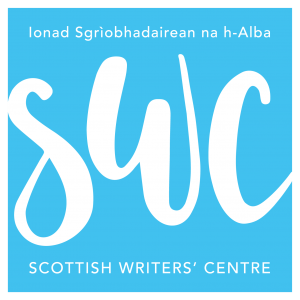 Andrew Greig begins his master class with a moment of modesty.
Andrew Greig begins his master class with a moment of modesty.
‘“Master class” sounds odd to me,’ he tells us, leaning on the edge of the table at the front on the room. ‘I’m not at ease being a teacher, and being a “master” is something I have no sense of whatsoever. I’m in the middle of my apprenticeship,’ he insists, ‘although I think I’m beginning to get the hang of it,’ he adds with a smile. This kind of humility was emblematic of the evening as a whole, over the course of which, through a roughly chronological review of Andrew’s life, we gained an intimate understanding not only of the writer who produces the poetry, fiction, and non-fiction, but also the man who lives the life that inspires them.
Andrew began his creative life as a musician, as music was his first love and the dominant artistic field in the 1960s when he was growing up. His literary life began five years later, when he realised that he wasn’t ‘talented, determined, or good looking enough’ to succeed in that field – you need at least two of the three to really make it in music, he tells us. He noticed, however, that people were interested in reading and publishing his lyrics even if they weren’t interested in recording his songs, and from this observation he took his first lesson and gave us our first piece of advice: stick to what you’re good at.
Having grown up in Anstruther, Andrew moved to Edinburgh at the age of eighteen, and was struck immediately by the vibrant poetry scene that was thriving in the capital. Once there, he began trying to write political poetry in rhymed verse, because that’s what the majority of other poets were doing, but he found the resultant works uninteresting and unconvincing. ‘I’ve never been terribly good at rhyming poems,’ he tells us. ‘It makes me trite and banal. It’s about identifying what you can do instead, and pushing that further.’
As he was doing so, Andrew came to know the already established poets in the Edinburgh scene, people like Sorley MacLean and Norman MacCaig, the latter of whom became an early mentor for the young writer. In a fascinating reading from ‘The Loch of The Green Corrie’, Andrew described their first proper meeting at Norman’s house, in the course of which Norman praised Andrew’s early poems because they were similar to his works, but offered him a second significant lesson: ‘Maybe you should write some like your own’.
Peers were as important as mentors to Andrew in his search for what was his own. While studying Philosophy at Edinburgh University he showed almost everything he wrote to his friends, who provided ‘agreements and disagreements’ and, most importantly, ‘perspectives’. Without these other perspectives on your work, Andrew says, you can become ‘delusional’ in creative solitude. It’s important, however, to retain always the sense of what it is you’re best at, he continued, as it’s easy to get ‘washed away’ by ‘the scalding water of other people’s opinions’.
Other people’s opinions, of course, proved very important to his success, and resulted in fact in his first significant writing job. After the break though of an early poem entitled ‘Men on Ice’, which treats the act of climbing as an existential metaphor for the terror and exhilaration of being alive, Andrew was invited to the Himalayas by a real climber who presumed Andrew was the same, and who wanted him to write a book about the expedition. Despite a lack of experience and a fear of heights, Andrew agreed to go because: ‘I knew I would wonder forever if I didn’t’.
This kind of openness was crucial to Andrew’s career, and also to his creative process. ‘My experience is you can’t make it happen,’ Andrew says, ‘but, if you make yourself available, it’s more likely to happen. If we don’t answer the door when someone knocks, we’ll never who know they were, and they might not come back.’
The book that resulted from this Himalayan trip, Summit Fever, was his first book of prose, which taught him ‘to look at other people, and watch’. In doing so, he realised he ‘liked examining life, and thinking about it, and presenting it to other people so it would be like they were there when they were reading it themselves.’
When Andrew later found himself reading his own journal, which reminded him somewhat of a novel, he realised he liked not only examining life, but inventing it too, and it was this discovery that ultimately led to his first fictional prose. He found the process of inventing things successfully to be one of hybridisation and metamorphosis: when given an attribute that wasn’t their own, characters based on real people suddenly came alive in a new way, and stopped wanting to do what their physical counterparts had done.
Again, Andrew returned to this idea of openness, and a willingness to discover, as being essential to the creative process. He doesn’t plot his novels in great detail before he begins: he has a notion of a direction of travel, of tones and spaces, but no plan beyond these. ‘You have to be open to it not going according to plan,’ he tell us, ‘which is actually the most useful thing that can happen, because it’s then that you go from playing God, to watching these things unfold with the same curiosity and interest as a reader.’ ‘Follow the clues, follow the promptings,’ he continued. ‘Once your characters cease to have glass heads, then they’re behaving like real people.’
 Andrew often uses frameworks to provide a basic structure for his explorations, structure being the key component that differentiates a novel from a short story or a poem in his opinion. In the past he has used variously: memory games to provide consistent threads through different chapters; Rock, Paper, Scissors as a way of modelling dialectics and power-relationships between characters; and other literary forms like ballads to give a shape to his texts and provide constructs to create a vessel into which life through writing can flow.
Andrew often uses frameworks to provide a basic structure for his explorations, structure being the key component that differentiates a novel from a short story or a poem in his opinion. In the past he has used variously: memory games to provide consistent threads through different chapters; Rock, Paper, Scissors as a way of modelling dialectics and power-relationships between characters; and other literary forms like ballads to give a shape to his texts and provide constructs to create a vessel into which life through writing can flow.
This flowing of clarity is, Andrew reveals as the evening ebbs, the ideal outcome of this combination of mindfulness and subtle structuring. ‘At best it’s like transcription, not writing. You just hear the words coming through, and you don’t interfere with them.’
‘And,’ he adds, in a final moment of characteristic modesty, ‘sometimes you just get lucky.’



